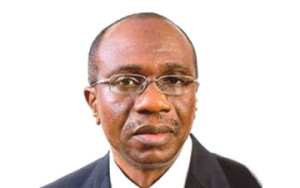AMIDST rising criticisms that Central Bank of Nigeria (CBN’s) policies are anti-people and the economy, the Governor, Godwin Emefiele, said they are bitter pills with long-term benefits.
Speaking at the 49th Annual Bankers’ Dinner hosted by the Chartered Institute of Bankers of Nigeria (CIBN) in Lagos, he said while it is too soon to articulate the benefits, the economy is headed in the right direction. He insisted that the CBN will always act in good faith in pursuing price and financial system stability.
The CBN had instituted many polices, including the Treasury Single Account (TSA), restrictions of foreign exchange (forex) for the importation of some 41 items, financial bailout for some states and capital controls.
The CBN under Emefiele has also insisted that the naira will not be further devalued and has been implementing fixed exchange rate regime instead of flexible exchange rate.
Such policies have come under heavy criticisms, including from former CBN Governor, Charles Soludo, who believes CBN’s forex policies under Emefiele are not in the best interest of the economy.
Soludo said politics of naira devaluation and CBN’s promotion of fixed exchange rate do not promote economic growth. “The economy has always done worse in fixed exchange rate regime. Capital will fly out. Such policies do more harm than good. Capital flight in a country that is in dire need of capital is bad. Private capital is on the run,” Soludo said at the third anniversary lecture of Realnews Magazine held in Lagos.
He believes forex restrictions on the import of 41 items by the apex bank is a mismatch and is causing the economy to go down.
“What is going on in the capital market is not an accident. SMEs suffer the most. No economy has succeeded with overvalued exchange rate,” he insisted.
But Emefiele told bankers on Friday night that CBN’s policies under his watch are meant to promote the development of productive sectors of the economy and expand the country’s aggregate supply capacity. The bank chief said the regulator had been targeting specific productive sectors in the economy that have the capacity to create jobs on a mass scale, reduce the country’s dependence on foreign goods and significantly reduce its huge import bills.
He regretted that for the first nine months of this year, Nigeria’s import bill stood at N917 billion, and is expected to hit N1.2 trillion by year-end.
Emefiele said Nigerians must understand the difficulties and headwinds being faced by the country today. “I am not interested in the short-term pains of the policies. We need to diversify from oil and create jobs for the unemployed youths,” he said.
He said the CBN is not only encouraging large corporations to produce locally, but is also taking steps that ensure that Small and Medium Enterprises (SMEs) become conglomerates of tomorrow.
The CBN boss said: “We want both the conglomerates and SMEs to support us at this trying time because better days are around the corner”.
Emefiele said the global economy has been facing headwinds since the third quarter of last year because of drop in oil prices.
For Nigeria, he said the country’s foreign reserves dropped from $37 billion in 2014 to $30 billion in March this year because of speculative attack on the local currency. He said the naira, has depreciated by about 23 per cent in the last one year, prompting the CBN to examine forex demand by importers.
Emefiele said the CBN has been ensuring that foreign exchange demand by importers with legitimate demand are recognised and met. He said Nigeria still imports variety of products that can be produced locally and that does not help the economy to grow. “Nigeria cannot continue on this path of importing anything and everything. That is unsustainable,” he said.
He said the introduction of Bank Verification Number (BVN) for forex purchases by Bureaux De Change (BDC) operators will further help the regulators’ drive to enhance transparency in the forex market.
“The BVN for forex buyers has allowed only genuine operators to remain in trade while speculators are out of business,” he said.
The President/Chairman of Council (CIBN), Mrs. Debola Osibogun, said the financial services sector was inspired by the focus, energy and consistency being deployed by the present administration to bring about a new Nigeria through various change initiatives.
“It is imperative to state that the role of the banking sector in achieving this economic development focus is germane although not without obvious challenges peculiar to our nation and which must be genuinely addressed,” she said.
END



Be the first to comment